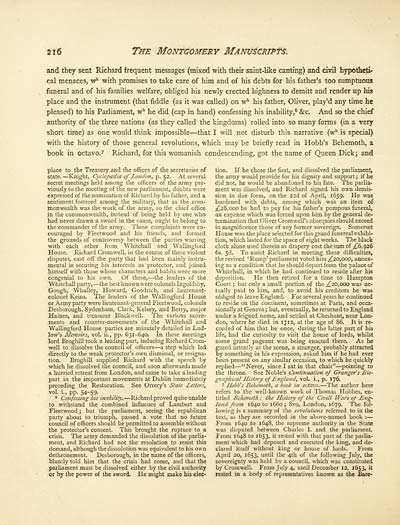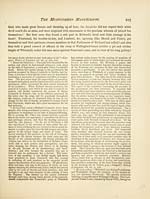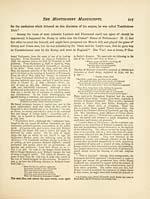Montgomery manuscripts
(230) Page 216
Download files
Complete book:
Individual page:
Thumbnail gallery: Grid view | List view

216
The Montgomery Manuscripts.
and they sent Richard frequent messages (mixed with their saint-like canting) and civil hypotheti-
cal menaces, w b with promises to take care of him and of his debts for his father's too sumptuous
funeral and of his families welfare, obliged his newly erected highness to demitt and render up his
place and the instrument (that fiddle (as it was called) on w h his father, Oliver, play'd any time he
pleased) to his Parliament, w h he did (cap in hand) confessing his inability, 6 &c. And so the chief
authority of the three nations (as they called the kingdoms) rolled into so many forms (in a very
short time) as one would think impossible — that I will not disturb this narrative (w h is special)
with the history of those general revolutions, which may be briefly read in Hobb's Behemoth, a
book in octavo. 7 Richard, for this womanish condescending, got the name of Queen Dick; and
place to the Treasury and the offices of the secretaries of
state. —Knight, Cyclopedia of London, p. 52. At several
secret meetings held among the officers of the army pre-
viously to the meeting of the new parliament, doubts were
expressed of the nomination of Richard by his father, and a
sentiment fostered among the military, that as the com-
monwealth was the work of the army, so the chief office
in the commonwealth, instead of being held by one who
had never drawn a sword in the cause, ought to belong to
the commander of the army. These complaints were en-
couraged by Fleetwood and his friends, and formed
the grounds of controversy between the parties warring
•with each other from Whitehall and Wallingford
House. Richard Cromwell, in the course of these violent
disputes, cast off the party that had been mainly instru-
mental in securing his interests as protector, and joined
himself with those whose characters and habits were more
congenial to his own. Of these, — the leaders of the
Whitehall party, — the best known were colonels Ingoldsby,
Gough, Whalley, Howard, Goodrich, and lieutenant-
colonel Kerns. The leaders of the Wallingford House
or Army party were lieutenant-general Fleetwood, colonels
Desborough, Sydenham, Clark, Kelsey, and Berry, major
Haines, and treasurer Blackwell. The various move-
ments and counter-movements of the Whitehall and
Wallingford House parties are minutely detailed in Lud-
low's Memoirs, vol. ii., pp. 631-640. In these meetings
lord Broghill took a leading part, inducing Richard Crom-
well to dissolve the council of officers — a step which led
directly to the weak protector's own dismissal, or resigna-
tion. Broghill supplied Richard with the speech by
which he dissolved the council, and soon afterwards made
a hurried retreat from London, and came to take a leading
part in the important movements at Dublin immediately
preceding the Restoration. See Orrery's State Letters,
vol. i., pp. 54-59-
6 Confessing his inability. — Richard proved quite unable
to withstand the combined influence of Lambert and
Fleetwood ; but the parliament, seeing the republican
party about to triumph, passed a vote that no future
council of officers should be permitted to assemble without
the protector's consent. This brought the rupture to a
crisis. The army demanded the dissolution of the parlia-
ment, and Richard had not the resolution to resist this
demand, although the dissolution was equivalent to his own
dethronement. Desborough, in the name of the officers,
bluntly told him that the crisis had come, and that the
parliament must be dissolved either by the civil authority
or by the power of the sword. He might make his elec-
tion. If he chose the first, and dissolved the parliament,
the army would provide for his dignity and support; if he
did not, he would be abandoned to his fate. The parlia-
ment was dissolved, and Richard signed his own demis-
sion in due form, on the 22d of April, 1659. He was
burdened with debts, among which was an item of
£28,000 he had to pay for his father's pompous funeral,
an expense which was forced upon him by the general de-
termination that Oliver Cromwell's obsequies should exceed
in magnificence those of any former sovereign. Somerset
House was the place selected for this grand funereal exhibi-
tion, which lasted for the space of eight weeks. The black
cloth alone used therein as drapery cost the sum of .£6,0.26
6s. 5d. To assist Richard in meeting these difficulties,
the revived ' Rump' parliament voted him £20,000, annex-
ing as a condition that he should depart from the palace of
Whitehall, in which he had continued to reside after his
deposition. He then retired for a time to Hampton
Court ; but only a small portion of the £20,000 was ac-
tually paid to him, and, to avoid his creditors he was
obliged to leave England. For several years he continued
to reside on the continent, sometimes at Paris, and occa-
sionally at Geneva ; but, eventually, he returned to England
under a feigned name, and settled at Cheshunt, near Lon-
don, where he died in 17 12, at the age of 86. It is re-
corded of him that he once, during the latter part of his
life, had the curiosity to visit the house of lords, whilst
some grand pageant was being enacted there. As he
gazed intently at the scene, a stranger, probably attracted
by something in his expression, asked him if he had ever
been present on any similar occasion, to which he quickly
replied — "Never, since I sat in that chair" — pointing to
the throne. See Noble's Continuation of Granger's Bio-
graphical History of England, vol. i., p. 1 76.
i HobPs Behemoth, a book in octavo. — The author here
refers to the well-known work of Thomas Hobbes, en-
titled Behemoth : the History of the Civill Wars op Eng-
land from 1640 to 1660; Svo, London, 1679. The fol-
lowing is a summary of the revolutions referred to in the
text, as they are recorded in the above-named book : —
From 1640 to 1648, the supreme authority in the State
was disputed between Charles I. and the parliament.
From 1648 to 1653, it rested with that part of the parlia-
ment which had deposed and executed the king, and de-
clared itself without king or house of lords. From
April 20, 1653, until the 4th of the following July, the
sovereignty was held by a council, which was constituted
by Cromwell. From July 4, until December 12, 1653, it
rested in a body of representatives known as the Bare-
The Montgomery Manuscripts.
and they sent Richard frequent messages (mixed with their saint-like canting) and civil hypotheti-
cal menaces, w b with promises to take care of him and of his debts for his father's too sumptuous
funeral and of his families welfare, obliged his newly erected highness to demitt and render up his
place and the instrument (that fiddle (as it was called) on w h his father, Oliver, play'd any time he
pleased) to his Parliament, w h he did (cap in hand) confessing his inability, 6 &c. And so the chief
authority of the three nations (as they called the kingdoms) rolled into so many forms (in a very
short time) as one would think impossible — that I will not disturb this narrative (w h is special)
with the history of those general revolutions, which may be briefly read in Hobb's Behemoth, a
book in octavo. 7 Richard, for this womanish condescending, got the name of Queen Dick; and
place to the Treasury and the offices of the secretaries of
state. —Knight, Cyclopedia of London, p. 52. At several
secret meetings held among the officers of the army pre-
viously to the meeting of the new parliament, doubts were
expressed of the nomination of Richard by his father, and a
sentiment fostered among the military, that as the com-
monwealth was the work of the army, so the chief office
in the commonwealth, instead of being held by one who
had never drawn a sword in the cause, ought to belong to
the commander of the army. These complaints were en-
couraged by Fleetwood and his friends, and formed
the grounds of controversy between the parties warring
•with each other from Whitehall and Wallingford
House. Richard Cromwell, in the course of these violent
disputes, cast off the party that had been mainly instru-
mental in securing his interests as protector, and joined
himself with those whose characters and habits were more
congenial to his own. Of these, — the leaders of the
Whitehall party, — the best known were colonels Ingoldsby,
Gough, Whalley, Howard, Goodrich, and lieutenant-
colonel Kerns. The leaders of the Wallingford House
or Army party were lieutenant-general Fleetwood, colonels
Desborough, Sydenham, Clark, Kelsey, and Berry, major
Haines, and treasurer Blackwell. The various move-
ments and counter-movements of the Whitehall and
Wallingford House parties are minutely detailed in Lud-
low's Memoirs, vol. ii., pp. 631-640. In these meetings
lord Broghill took a leading part, inducing Richard Crom-
well to dissolve the council of officers — a step which led
directly to the weak protector's own dismissal, or resigna-
tion. Broghill supplied Richard with the speech by
which he dissolved the council, and soon afterwards made
a hurried retreat from London, and came to take a leading
part in the important movements at Dublin immediately
preceding the Restoration. See Orrery's State Letters,
vol. i., pp. 54-59-
6 Confessing his inability. — Richard proved quite unable
to withstand the combined influence of Lambert and
Fleetwood ; but the parliament, seeing the republican
party about to triumph, passed a vote that no future
council of officers should be permitted to assemble without
the protector's consent. This brought the rupture to a
crisis. The army demanded the dissolution of the parlia-
ment, and Richard had not the resolution to resist this
demand, although the dissolution was equivalent to his own
dethronement. Desborough, in the name of the officers,
bluntly told him that the crisis had come, and that the
parliament must be dissolved either by the civil authority
or by the power of the sword. He might make his elec-
tion. If he chose the first, and dissolved the parliament,
the army would provide for his dignity and support; if he
did not, he would be abandoned to his fate. The parlia-
ment was dissolved, and Richard signed his own demis-
sion in due form, on the 22d of April, 1659. He was
burdened with debts, among which was an item of
£28,000 he had to pay for his father's pompous funeral,
an expense which was forced upon him by the general de-
termination that Oliver Cromwell's obsequies should exceed
in magnificence those of any former sovereign. Somerset
House was the place selected for this grand funereal exhibi-
tion, which lasted for the space of eight weeks. The black
cloth alone used therein as drapery cost the sum of .£6,0.26
6s. 5d. To assist Richard in meeting these difficulties,
the revived ' Rump' parliament voted him £20,000, annex-
ing as a condition that he should depart from the palace of
Whitehall, in which he had continued to reside after his
deposition. He then retired for a time to Hampton
Court ; but only a small portion of the £20,000 was ac-
tually paid to him, and, to avoid his creditors he was
obliged to leave England. For several years he continued
to reside on the continent, sometimes at Paris, and occa-
sionally at Geneva ; but, eventually, he returned to England
under a feigned name, and settled at Cheshunt, near Lon-
don, where he died in 17 12, at the age of 86. It is re-
corded of him that he once, during the latter part of his
life, had the curiosity to visit the house of lords, whilst
some grand pageant was being enacted there. As he
gazed intently at the scene, a stranger, probably attracted
by something in his expression, asked him if he had ever
been present on any similar occasion, to which he quickly
replied — "Never, since I sat in that chair" — pointing to
the throne. See Noble's Continuation of Granger's Bio-
graphical History of England, vol. i., p. 1 76.
i HobPs Behemoth, a book in octavo. — The author here
refers to the well-known work of Thomas Hobbes, en-
titled Behemoth : the History of the Civill Wars op Eng-
land from 1640 to 1660; Svo, London, 1679. The fol-
lowing is a summary of the revolutions referred to in the
text, as they are recorded in the above-named book : —
From 1640 to 1648, the supreme authority in the State
was disputed between Charles I. and the parliament.
From 1648 to 1653, it rested with that part of the parlia-
ment which had deposed and executed the king, and de-
clared itself without king or house of lords. From
April 20, 1653, until the 4th of the following July, the
sovereignty was held by a council, which was constituted
by Cromwell. From July 4, until December 12, 1653, it
rested in a body of representatives known as the Bare-
Set display mode to:
![]() Universal Viewer |
Universal Viewer | ![]() Mirador |
Large image | Transcription
Mirador |
Large image | Transcription
Images and transcriptions on this page, including medium image downloads, may be used under the Creative Commons Attribution 4.0 International Licence unless otherwise stated. ![]()
| Histories of Scottish families > Montgomery manuscripts > (230) Page 216 |
|---|
| Permanent URL | https://digital.nls.uk/95235687 |
|---|
| Description | A selection of almost 400 printed items relating to the history of Scottish families, mostly dating from the 19th and early 20th centuries. Includes memoirs, genealogies and clan histories, with a few produced by emigrant families. The earliest family history goes back to AD 916. |
|---|

